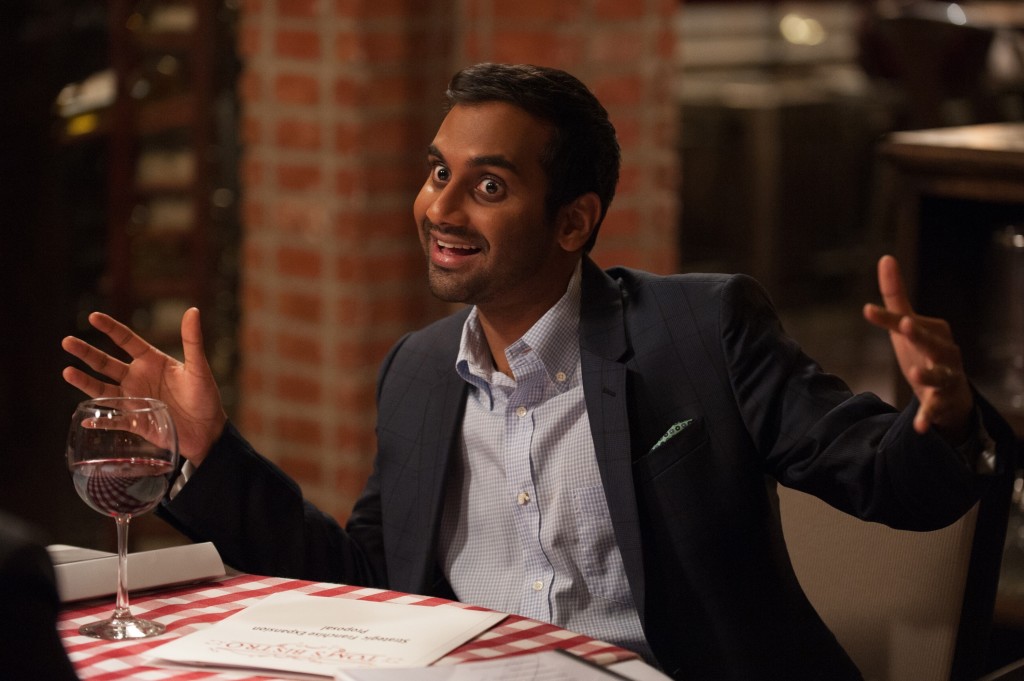I want to apologize in advance. I have a huge day ahead of me so I don’t have time to do a full screenplay review. Plus I’m still basking in the wonderful light of yesterday’s great screenplay. I don’t want to ruin that buzz by injecting some Max Landis script into my brain about time-traveling clowns that attack a skyscraper.
But I still want to leave you guys with a screenwriting tip.
So, I’ve been watching the second season of Aziz Ansari’s Master Of None. I’m four episodes in. For those who aren’t fans of Ansari, you should at least check out Episode 4, “First Date.” It’s a great example of what I tell you to do every day – find a fresh take on an old idea. Aziz and co-creator Alan Yang take the time worn cliche of a first date and infuse a modern spin into it. It was great.
However, the three episodes that preceded First Date weren’t very good. And as I was watching them, I was trying to figure out why. Aziz and Yang had set the first two episodes in Italy and the third, which deals with religion, back home. A common problem I noticed was that everything in these episodes felt staged. You could feel the actors reading their lines. You could see them trying to hit their marks.
For example, there’s a moment where Dev’s friend Alan comes to visit him, and the two go to the grocery store to talk. The scene was so staged and so artificial, they might as well have shown the entire production team behind them. Or there was a scene where Dev’s entire family goes out to eat at a restaurant. You could practically see the actors waiting for their turn to say their line.
At first I thought they may not have had the locations for long and had to cover everything in one take. Or the actors were still getting warmed up for the new season. But then I realized the problem wasn’t either of these things. The problem was in the writing. And it’s actually a mistake every writer makes multiple times in a screenplay.
What is it?
They hang their characters out to dry.
Hanging your characters out to dry means placing them in a scene with no purpose. No one is trying to get anything (a goal), and therefore the only thing driving the scene is dialogue. Now Master of None gets away with this better than others because Aziz and Yang write funny dialogue. But even if you’re funny, leaving your characters out to dry kills the scene.
The reason your actors’ movements and lines are so staged is because the characters don’t have any purpose in the scene. They’re literally at a supermarket, as actors, to film a scene. They’re not at the supermarket, as characters, to get anything.
The simple solution to this is to always have some kind of goal driving the scene. It could be the overall goal of the story that’s brought them to that location. Or it could be a more immediate goal that’s brought them there. The idea, then, is to have them attempt to achieve their objective, then make their dialogue secondary.
For example, there’s a later plot point where someone steals Dev’s wallet. Had you taken Dev and Alan and placed them in that same supermarket because they think the man who stole Dev’s wallet works there, now you’ve given the characters an objective in the scene. They can exchange virtually the same dialogue as they did before, but with this added element of snooping around, trying to find their man.
The thing with TV, however, is that it’s not as plot-heavy as features. So you’re not always going to have juicy plot points to play with. However, if you don’t have plot pushing the scene, make sure you have conflict. Which leads us to a second option to save your scenes: Add an issue between the two characters.
You’ll actually see this in reality TV a lot. Whenever they put two (or more) characters in a scene, they always make sure they have an issue to settle. Maybe one of them was spreading rumors. Maybe they got in a fight last night. Maybe there’s some unrequited romantic interest. Or maybe they just don’t like the way their friendship is going at the moment and want to address it. An issue gives a scene a point, as the drive to address the issue will create conflict and compel us, the audience, to see it resolved.
You never want to hang your characters out to dry. You can’t place them in a scene with no purpose. And no, exposition doesn’t count as “purpose.” Having characters talk about the big wedding that weekend isn’t entertaining. Make sure the characters either have a goal for being where they are or they have an issue to resolve. There ARE other ways to make scenes work, but these two options should take care of the majority of your scenes.


